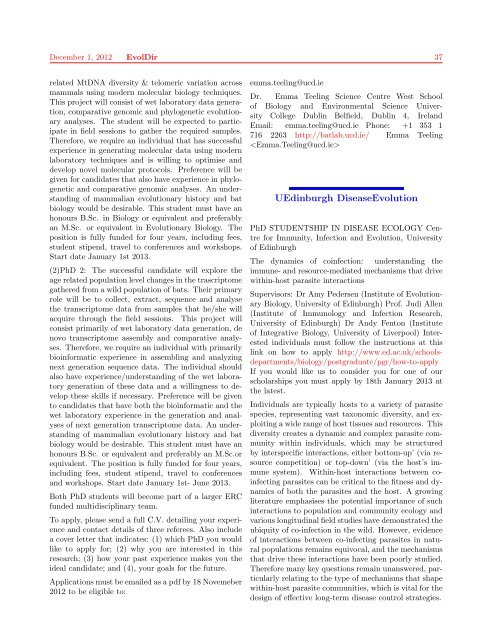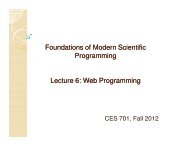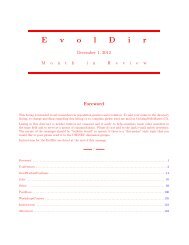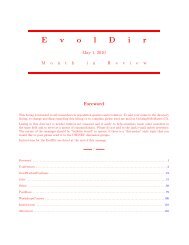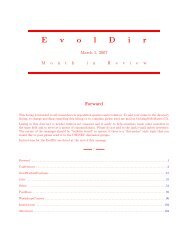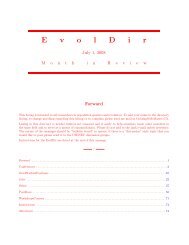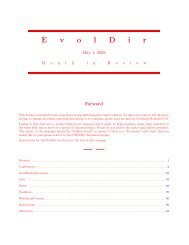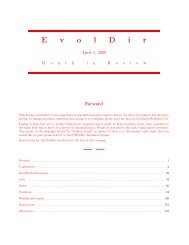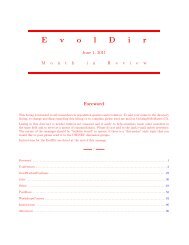E v o l D i r
E v o l D i r
E v o l D i r
Create successful ePaper yourself
Turn your PDF publications into a flip-book with our unique Google optimized e-Paper software.
December 1, 2012 EvolDir 37<br />
related MtDNA diversity & telomeric variation across<br />
mammals using modern molecular biology techniques.<br />
This project will consist of wet laboratory data generation,<br />
comparative genomic and phylogenetic evolutionary<br />
analyses. The student will be expected to participate<br />
in field sessions to gather the required samples.<br />
Therefore, we require an individual that has successful<br />
experience in generating molecular data using modern<br />
laboratory techniques and is willing to optimise and<br />
develop novel molecular protocols. Preference will be<br />
given for candidates that also have experience in phylogenetic<br />
and comparative genomic analyses. An understanding<br />
of mammalian evolutionary history and bat<br />
biology would be desirable. This student must have an<br />
honours B.Sc. in Biology or equivalent and preferably<br />
an M.Sc. or equivalent in Evolutionary Biology. The<br />
position is fully funded for four years, including fees,<br />
student stipend, travel to conferences and workshops.<br />
Start date January 1st 2013.<br />
(2)PhD 2: The successful candidate will explore the<br />
age related population level changes in the trascriptome<br />
gathered from a wild population of bats. Their primary<br />
role will be to collect, extract, sequence and analyse<br />
the transcriptome data from samples that he/she will<br />
acquire through the field sessions. This project will<br />
consist primarily of wet laboratory data generation, de<br />
novo transcriptome assembly and comparative analyses.<br />
Therefore, we require an individual with primarily<br />
bioinformatic experience in assembling and analyzing<br />
next generation sequence data. The individual should<br />
also have experience/understanding of the wet laboratory<br />
generation of these data and a willingness to develop<br />
these skills if necessary. Preference will be given<br />
to candidates that have both the bioinformatic and the<br />
wet laboratory experience in the generation and analyses<br />
of next generation transcriptome data. An understanding<br />
of mammalian evolutionary history and bat<br />
biology would be desirable. This student must have an<br />
honours B.Sc. or equivalent and preferably an M.Sc.or<br />
equivalent. The position is fully funded for four years,<br />
including fees, student stipend, travel to conferences<br />
and workshops. Start date January 1st- June 2013.<br />
Both PhD students will become part of a larger ERC<br />
funded multidisciplinary team.<br />
To apply, please send a full C.V. detailing your experience<br />
and contact details of three referees. Also include<br />
a cover letter that indicates: (1) which PhD you would<br />
like to apply for; (2) why you are interested in this<br />
research; (3) how your past experience makes you the<br />
ideal candidate; and (4), your goals for the future.<br />
Applications must be emailed as a pdf by 18 Novemeber<br />
2012 to be eligible to:<br />
emma.teeling@ucd.ie<br />
Dr. Emma Teeling Science Centre West School<br />
of Biology and Environmental Science University<br />
College Dublin Belfield, Dublin 4, Ireland<br />
Email: emma.teeling@ucd.ie Phone: +1 353 1<br />
716 2263 http://batlab.ucd.ie/ Emma Teeling<br />
<br />
UEdinburgh DiseaseEvolution<br />
PhD STUDENTSHIP IN DISEASE ECOLOGY Centre<br />
for Immunity, Infection and Evolution, University<br />
of Edinburgh<br />
The dynamics of coinfection: understanding the<br />
immune- and resource-mediated mechanisms that drive<br />
within-host parasite interactions<br />
Supervisors: Dr Amy Pedersen (Institute of Evolutionary<br />
Biology, University of Edinburgh) Prof. Judi Allen<br />
(Institute of Immunology and Infection Research,<br />
University of Edinburgh) Dr Andy Fenton (Institute<br />
of Integrative Biology, University of Liverpool) Interested<br />
individuals must follow the instructions at this<br />
link on how to apply http://www.ed.ac.uk/schoolsdepartments/biology/postgraduate/pgr/how-to-apply<br />
If you would like us to consider you for one of our<br />
scholarships you must apply by 18th January 2013 at<br />
the latest.<br />
Individuals are typically hosts to a variety of parasite<br />
species, representing vast taxonomic diversity, and exploiting<br />
a wide range of host tissues and resources. This<br />
diversity creates a dynamic and complex parasite community<br />
within individuals, which may be structured<br />
by interspecific interactions, either bottom-up’ (via resource<br />
competition) or top-down’ (via the host’s immune<br />
system). Within-host interactions between coinfecting<br />
parasites can be critical to the fitness and dynamics<br />
of both the parasites and the host. A growing<br />
literature emphasises the potential importance of such<br />
interactions to population and community ecology and<br />
various longitudinal field studies have demonstrated the<br />
ubiquity of co-infection in the wild. However, evidence<br />
of interactions between co-infecting parasites in natural<br />
populations remains equivocal, and the mechanisms<br />
that drive these interactions have been poorly studied.<br />
Therefore many key questions remain unanswered, particularly<br />
relating to the type of mechanisms that shape<br />
within-host parasite communities, which is vital for the<br />
design of effective long-term disease control strategies.


